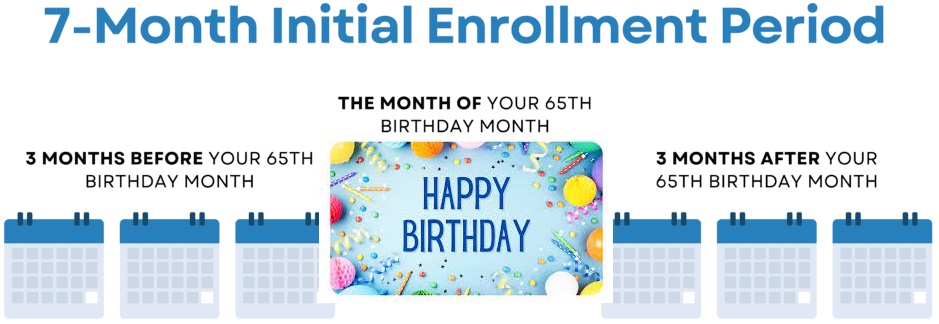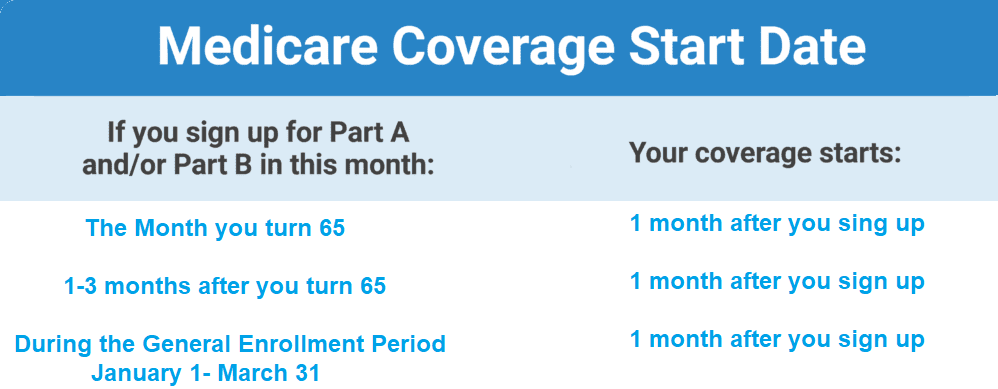Applying for Medicare may seem daunting, but rest assured that the process is simpler than you may imagine. Each year, we guide numerous individuals through the steps of signing up for Medicare, making it a hassle-free experience.
Continue reading to find all the essential information you need to successfully apply for Medicare.
When it comes to Medicare eligibility and applications for Parts A (hospital insurance) and B (outpatient medical insurance), the Social Security Administration is responsible. They provide multiple convenient options for applying, allowing you to choose the method that suits you best. If you are approaching the age of 65 and becoming eligible for Medicare, you can apply as early as three months before your 65th birthday month. It is advisable to start the process early to ensure that you receive your new Medicare card before your coverage begins.
During this period, known as your Medicare Initial Enrollment Period, you can enroll in Part A and Part B. It is also the designated time to enroll in Medicare Part D, which covers prescription drugs. Since Original Medicare does not include prescription drug coverage, you will need to purchase Part D separately from an insurance company. It is important to note that you do not enroll in Part D through the Social Security Administration, as it is a voluntary program.
When to Apply for Medicare
Medicare and Social Security income benefits are distinct entities. Upon reaching the age of 65, individuals become eligible for Medicare, regardless of whether they are receiving retirement income benefits. If you are a U.S. citizen aged 65 or older and require medical insurance, you have the right to enroll in Medicare. Additionally, certain disabilities, such as Amyotrophic Lateral Sclerosis (Lou Gehrig disease) or End-Stage Renal disease (ESRD), as well as the need for a transplant or dialysis, may qualify you for early Medicare enrollment.
Medicare will not notify you when it’s time to sign up, so it’s important to be proactive, especially if you live outside of the country. If you are already receiving Social Security income benefits or Railroad Retirement Board benefits, you will be automatically enrolled in Medicare Parts A and B at age 65. Your Medicare card should arrive 1-2 months before your 65th birthday. This timeline also applies to individuals who qualify for Medicare early due to disability. However, if you live in Puerto Rico, you will not automatically receive Part B benefits and will need to apply for it separately, even if you receive Social Security benefits before turning 65. On the other hand, if you are not yet receiving retirement benefits, you will need to submit a Medicare application yourself. The responsibility lies with you to know when and how to enroll in Medicare.
Initial Enrollment Period
During your Initial Enrollment Period (IEP), which spans 7 months, you can enroll in Medicare Parts A, B, and D. This period commences 3 months prior to your 65th birthday month and extends for 3 months after your birth month. By enrolling in Medicare within your IEP, you can avoid any late penalties and there are no waiting periods for pre-existing conditions.

The timing of Medicare Parts A, B, and D registration is contingent upon whether Medicare will serve as your primary coverage or if you still maintain employer coverage.
Applying for Medicare As Your Primary Coverage
If Medicare is going to be your primary coverage, it is recommended that you enroll in Medicare three months before your birth month. This way, your Medicare benefits will start on the first day of the month in which you turn 65, ensuring that you receive the benefits promptly. The start date of your Medicare coverage is influenced by the timing of your application, making it crucial to be aware of the deadlines in advance. Nevertheless, if you are in your Initial Enrollment Period (IEP) and your birth month has already passed, this chart indicates that you will need to wait for your coverage to begin. It is evident why it is generally advantageous to apply for Medicare prior to your 65th birthday month, but ultimately, the decision of when to apply is up to you.

Applying During the General Enrollment Period
If you do not have any other health insurance and you do not enroll during your 7-month Initial Enrollment Period (IEP), you will incur a 10% late enrollment penalty for Part B for every full 12-month period that you were not enrolled. In order to apply, you would have to wait for the General Enrollment Period, which takes place from January 1 to March 31 each year. However, please note that your Part A and Part B coverage would only become effective on the 1st of the month following your application. This means that during this waiting period, you would not have any hospital or medical insurance, which could have severe financial consequences.
Medicare Enrollment and Small Employer Coverage
If you are covered by a small employer (less than 20 employees), it is crucial to enroll in both parts of Medicare during your IEP. Medicare will take precedence if your employer has less than 20 employees. As Medicare will be the primary coverage, it is advisable to provide your doctors with your Medicare card first. Filing for Medicare at the age of 65 holds significant importance, especially if you are employed by a small employer.
Applying for Medicare When you Have Large Employer Coverage
Medicare has the ability to coordinate with your employer insurance, even if you or your spouse are still actively working. If you or your spouse are currently employed by a company with 20 or more employees and have coverage through that employer, Medicare will serve as a secondary insurance to your employer’s coverage.
In this scenario, you have the option to either enroll in Medicare Part B or delay your enrollment until a later date. It’s important to note that your group health plan likely already includes coverage for medical services, so delaying your enrollment in Part B can help you save money until you retire from your job.
Determining when to apply for Medicare can vary for each individual. Unfortunately, there are instances where workers at Social Security may not fully understand these rules, which can have a significant impact on you. To ensure you receive accurate information and guidance, it is advisable to seek assistance from a Medicare insurance agent such as Cindy’s Health Insurance Services. Our team has successfully resolved Medicare enrollment issues for our clients by providing them with factual information during numerous conference calls with Social Security.
In conclusion, in the event that you are still employed at the age of 65, we will assess the expenses associated with your employer’s insurance in comparison to Medicare. If it is more advantageous for you to retain your employer’s coverage, we can assist you in determining whether to enroll in Parts A or B, or both.
Moreover, if you decide to apply for Medicare after turning 65 while having credible employer coverage, you will be eligible for a Special Enrollment Period (SEP). To avail of this SEP, you will be required to submit CMS form 40B and CMS form L564 as evidence of your credible coverage during your employment. Please note that when applying through a SEP, it may take several weeks for your Medicare approval to be processed.
How to Apply for Medicare
There are multiple methods available to apply for Medicare, ensuring that you will discover an option that suits your schedule the best. It is important to remember that Medicare offers personalized coverage, which means you will need to complete your own application.

How to Apply Online for Medicare
Social Security provides a convenient online application for Medicare that can be completed in less than ten minutes. It is not necessary to receive income benefits in order to apply for Medicare. Simply visit the Social Security website, create an account, and follow the links to apply for Medicare.
If you wish to apply for both Social Security retirement benefits and Medicare simultaneously, you can visit the following link: https://www.ssa.gov/retire
For those who only want to apply for Medicare, the link to visit is: https://www.ssa.gov/benefits/medicare/
While you await the processing of your request by Social Security, our friendly agents are available to assist you in understanding your Medicare Supplement insurance options. We will provide you with helpful resources and ensure that your coverage is prepared for you.
Enrolling in Medicare online is undoubtedly the simplest method, but occasionally individuals encounter issues due to incorrect data in Social Security’s system. In such cases, you may consider signing up by phone. Let’s explore that option next.
How to Apply for Medicare by Phone
Applying for Medicare by phone is just as easy as applying for Medicare online. Contact Social Security at 1-800-772-1213 ( for TTY users, it’s 1-800-325-0778) and tell the representative that you wish to apply for Medicare. If you have Railroad Retirement, you can contact the U.S. Railroad Retirement Board at 1-877-772-5772. Sometimes you will be helped immediately. If the volume of calls is high, Social Security will schedule a telephone appointment with you to take your application over the phone.
Your SS representative may send you some forms to complete. Generally, these forms are simple. One caveat about phone applications for Medicare is that they take longer. The forms have to be mailed to you, and then you complete them and mail them back. This can cause delays. Use the phone enrollment option only if you have a month or two lead time before your intended Medicare effective date.
Finally, there are some people who just feel better handling their Medicare enrollment in person. So let’s close by going over how to apply for Medicare in person.
How to Apply for Medicare in Person
To apply for Medicare, some individuals find it more preferable to visit a local Social Security office in person. This option proves to be convenient especially if you are approaching the age of 65 and require a quick processing of your application. To locate the nearest office in your state, simply visit the Social Security website. Once you have scheduled a meeting with a representative, make sure to request a printout that confirms your application for Medicare Part A & B. This document will provide you with all the necessary details to proceed with your Medicare Supplement application and/or Part D prescription drug plan. Furthermore, you can inquire about your Medicare expenses during your meeting with the representative. This includes understanding the eligibility criteria for premium-free Part A, the potential surcharges associated with the Income Related Monthly Adjustment Amount (IRMAA), as well as exploring various payment options. For instance, if you do not receive Social Security benefits, you have the choice to pay a direct quarterly bill or opt for monthly online payments.
Common Questions About Applying for Medicare
What is Medicare?
Medicare, a nationwide health insurance program, provides hospital and medical coverage through two distinct components. Medicare Part A encompasses inpatient hospital care, hospice care, skilled nursing facility care, home health care, and additional services. On the other hand, Part B caters to outpatient services such as doctor visits, surgeries, durable medical equipment, and more. It is important to note that Medicare does not fully cover the expenses associated with these services.
When will I get my Original Medicare card?
To put it differently, what is the timeframe for receiving your Medicare card after submitting your application? Typically, you can expect to receive your Medicare card approximately three weeks after applying. However, if you are already receiving Social Security benefits when you reach the age of 65, your card will be delivered to your mailbox around two months prior to your 65th birthday. Upon receiving your card, it is crucial to remember to enroll in Part D for prescription drug coverage before your Initial Enrollment Period concludes.
Do I automatically get Medicare when I turn 65?
Perhaps! If you have been receiving Social Security benefits for a minimum of four months prior to your 65th birthday month, you will be enrolled in Medicare automatically when you turn 65. However, if this is not the case, you will need to personally enroll in Medicare.
When is open enrollment for Medicare?
Your Medicare open enrollment is determined by your birthday. It is a seven-month window that starts three months before your 65th birthday month. To avoid penalties, make sure to enroll for Medicare during this period. It is important not to mix up this enrollment period with the Annual Election Period (AEP) in the autumn.
Do you have to apply for Medicare every year?
Fortunately, NO! A single Medicare application is sufficient.
Your Medicare Part A and Part B will be automatically renewed on an annual basis, as long as you continue to pay your monthly premiums. Similarly, your Part D drug plan will also be auto-renewed each year. However, it’s important to note that the benefits provided by your Part D drug plan may change from year to year. Therefore, it is advisable to review your coverage during the fall Annual Election Period.
It’s important to understand that applying for Medicare is just the initial step. Medicare does not cover all of your medical expenses. You are responsible for significant financial obligations such as deductibles and coinsurance. These costs can add up, so it’s crucial to be aware of your financial exposure.
Apply for Medicare with our help!
Still unsure about the process of signing up for Medicare? Don’t worry, you don’t have to navigate it alone. We are here to provide assistance and guide you through the Medicare enrollment process.
If you prefer having a personal guide to assist you from the initial Medicare application to setting up your Medigap and Part D plans, we are the perfect resource for you. Our services are completely free, and even after enrollment, you will have access to our Client Service Team at no additional cost for as long as you have your policy.
Takeaways
There are three distinct enrollment periods available for individuals to apply for Medicare: The Initial Enrollment Period, a Special Enrollment Period, and the General Enrollment Period. In the event that you have creditable employer insurance beyond the age of 65, you have the option to postpone Medicare enrollment and become eligible for a Special Enrollment Period. If you are not automatically enrolled in Medicare and require application, you have the flexibility to apply via phone, online, or in person at the Social Security office.
 Mario Arce
Mario Arce
I have been working with Medicare clients since 2016. I serve California members in San Bernardino & Riverside county.

